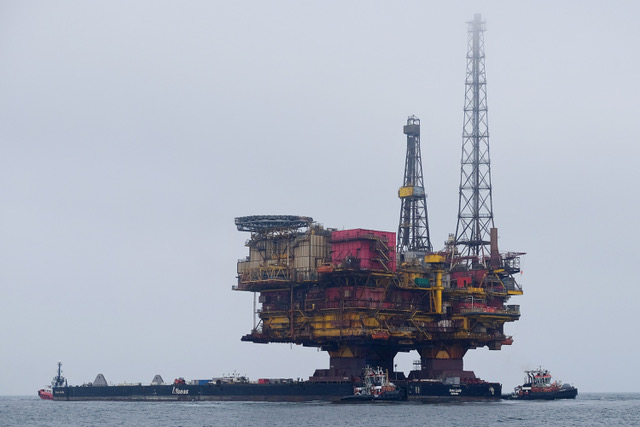
A Scottish conservationist has said changing European laws to allow more oil rigs to be left at sea could present a “colossal opportunity” for the North Sea.
Jonny Hughes, chief executive of the Scottish Wildlife Trust (SWT), said leaving infrastructure in place would save money, which could then be used to protect marine environments.
His comments come after Shell completed the single topside lift in its iconic Brent field. Part of the oil super major’s decommissioning plans include leaving the concrete legs behind. Read more here.
Mr Hughes did say that removing oil and gas infrastructure in its entirety should still be the starting point for industry and regulators.
Full-removal can be straightforward for many newer oil rigs, but trying to take out some of the older platforms presents environmental risks due to their sheer size and deep water location, he said.
Ospar, a pan-European body which was set up to protect the marine environment of the north-east Atlantic, requires companies to remove installations in their entirety once they reach the end of their production cycle
But oil companies can apply for an exemption under regulation 98/3 of the Ospar convention if they meet certain criteria, for example, having been built before 1999 and weighing more than a certain tonnage.
Only 40 of the North Sea’s 470 rigs qualify for an exemption from complete removal, according to Mr Hughes.
He said SWT would support “pragmatic solutions” to decommissioning based on the “likely net environmental impact of different options”.
Mr Hughes said: “The Trust accepts that our pragmatic stance may require a broadening out of the derogation criteria under regulation Ospar 98/3.
“If this was to happen then some rigs might be retained as artificial reefs. Examples of such ‘rigs to reefs’ projects have been successful in other parts of the world with the resulting ‘wrecks’ known to support a diverse range of marine life.
“Clearly there would be substantial financial savings from extending derogations beyond the 40 or so structures in the North Sea that currently qualify.
“We propose a percentage of the savings from any derogations are placed in a national Marine Stewardship Fund that supports marine conservation and research.
“This could create a triple-win: savings to the operator and taxpayer; enhanced (if modified) marine life around old structures; and a significant fund available for better stewardship of the marine environment.
“At a time when resources for marine conservation and research face an uncertain future, such a national fund could be very timely.
“Over the next 50 years, the decommissioning of oil and gas structures in the North Sea will be a colossal job.
“And yet, if we take an evidence-based, pragmatic approach it could also be a colossal opportunity to turn around many decades of environmental degradation in our seas and along our coasts.”
Recommended for you

